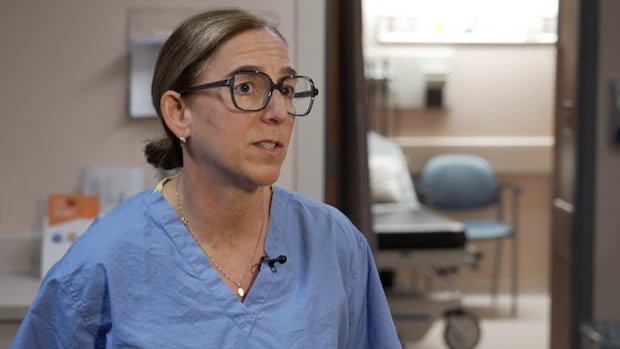Bethany Murray experienced two early pregnancy losses last year and wishes the wait for follow-up mental health care had been smoother.
Last winter, when Murray was five-weeks pregnant, she realized she was bleeding heavily and rushed to the emergency department. She was devastated to learn the pregnancy was ending. She and her husband tried again months later, but during an ultrasound appointment, she learned her second pregnancy had also ended early.
“My brain was just spinning,” Murray recalled. “You blame everything on yourself, even though at the end of the day, you finally know there’s nothing you did.”
About 15 per cent of pregnancies end before 14 weeks gestation, according to the Society of Obstetricians and Gynaecologists of Canada (SOGC).
Some will suffer early pregnancy loss, commonly called miscarriage, multiple times.
Psychological distress such as depression, anxiety and post-traumatic stress disorder are common after such a loss, according to the SOGC.

The new guidelines, released at the annual SOGC conference in Whistler, B.C., this week, are designed to improve care for patients. They include:
-
Run early pregnancy assessment clinics, where nurses and physicians offer compassionate care in a private area of the emergency department to women who are under 20 weeks’ gestation and experiencing pregnancy complications such as nausea, vomiting, vaginal bleeding, abdominal pain or cramping.
-
Offer the medications used to medically manage miscarriage free of charge to avoid surgery for some first trimester pregnancy losses.
-
Reform mental health screening to check for depression and post-traumatic stress disorder (PTSD) routinely in those diagnosed with pregnancy loss.
-
Provide bereavement counselling and other resources to help women who have suffered early pregnancy loss.
“Studies have clearly shown offering compassionate care in a proper way from the beginning can lessen that impact,” for long-term complications, said Dr. Lynn Murphy-Kaulbeck, the president of SOGC.
New national guidelines from the Society of Obstetricians and Gynaecologists of Canada aim to help patients experiencing early miscarriage, with specific trauma-informed care and improved mental health screening.
All-in-one clinics offer advantages
Murray agreed with the recommendations, saying she wished someone had talked with her in the hospital and connected her with support networks.
When she did go for mental health counselling, the Whitby, Ont., resident said it was difficult to be in a prenatal clinic waiting room.
“I think that there should be a separate room for women that have had early or late pregnancy losses where you’re not, you know, sitting in a room full of pregnant women.”
The SOGC’s recommendations include a call for more early pregnancy assessment clinics to be established across the country, similar to ones in Britain.
Dr. Modupe Tunde-Byass, an obstetrician and gynecologist who trained in Britain introduced such a clinic at North York General Hospital, where she currently works.

She welcomed the recommendation and estimates roughly one-third of hospitals offer similar clinics, which are concentrated in major cities.
Murphy-Kaulbeck, the SOGC president, says the recommendations also call for consistent and equitable care, which is especially important for rural areas where the emergency department is often the only option.
Early pregnancy loss is still “a condition that nobody talks about,” said Tunde-Byass, who is also an associate professor of obstetrics and gynaecology at the University of Toronto.
Lasting depression and anxiety
Seeing a health-care provider in a welcoming environment with “fine-tuned” care can make a difference to long-term health, Tunde-Byass said.
Rather than using a whole new set of resources, the clinics use existing hospital staff and space. At Tunde-Byass’s clinic, patients experiencing bleeding, abdominal pain and cramping, are cared for in a private room instead of the emergency department.
Etienne Crevier’s wife had a miscarriage two weeks ago. He wants grieving fathers-to-be to have access to the same parental insurance benefits to mourn the loss of a child as women do.
Having nurses or physicians trained in bereavement counselling or breaking bad news would help in staffing such clinics, Tunde-Byass said.
“When you think about depression, post traumatic stress disorders, anxiety, this actually goes on for six to 12 months,” Tunde-Byass said, adding that existing children and partners are also impacted.
Obstetrician and gynecologist Elyse Lackie, who works at North York General Hospital’s early pregnancy clinic and was not involved in developing the guidelines, says emergency departments are designed to treat severe, potentially life-threatening illness or injury quickly.
“But early pregnancy loss sometimes is not an acute situation, it’s something that’s unfolding over days to even weeks,” Lackie said.
That’s why those experiencing early pregnancy loss sometimes have to wait for hours at the emergency department, she said, while an early pregnancy assessment clinic is more ideal.
“We provide nursing care, physician care, ultrasound lab care all in one place,” Lackie said. “So we can help patients understand what is going on in their early pregnancy complications.”
Murray called the back-to-back pregnancy losses “soul crushing,” and now turns to a support group for people who have experienced the same thing she did.
“I’m doing a lot better now, but it wasn’t an easy process to go through, unfortunately,” she said.


